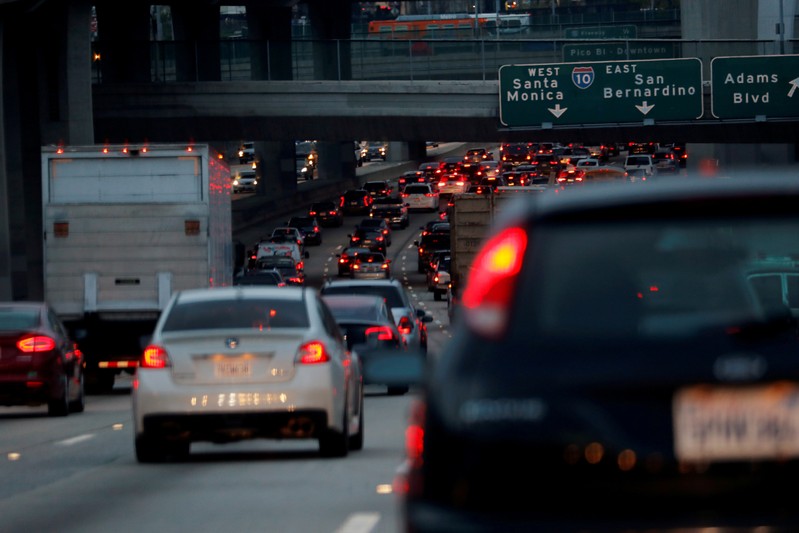
FILE PHOTO: Morning commuters travel in rush hour traffic towards Los Angeles, California, U.S., March 20, 2019. REUTERS/Mike Blake
October 28, 2019
By David Shepardson
WASHINGTON (Reuters) – Major automakers including General Motors Co <GM.N>, Toyota Motor Corp <7203.T>, Hyundai Motor Co <005380.KS> and Fiat Chrysler Automobiles NV <FCHA.MI> are asking to intervene in a lawsuit filed by 23 U.S. states last month, the companies said on Monday.
The automakers are seeking to intervene on behalf of the Trump administration after California and 22 other states sued in September to undo the Trump administration’s determination that federal law bars California from setting stiff tailpipe emission standards and zero-emission vehicle mandates.
Other automakers including Ford Motor Co <F.N>, Honda Motor Co <7267.T> and Volkswagen AG <VOWG_p.DE>, which announced a voluntary deal with California in July on emissions rules, are not joining the effort to intervene.
John Bozzella, president and chief executive of Global Automakers, a trade group representing major foreign automakers, said automakers had no choice.
“We did not ask for, nor did we want these questions to be decided in the courts, but we hope this pathway leads to a solution amenable to all parties,” said Bozzella, who is also a spokesman for the ad-hoc group dubbed the Coalition for Sustainable Automotive Regulation. “With our industry facing the possibility of multiple, overlapping and inconsistent standards that drive up costs and penalize consumers, we had an obligation to intervene.”
He said the companies still support a “middle ground” between California and the Trump administration that would see rising attainable fuel efficiency requirements. He said the Trump administration did not ask them to intervene.
A group of major environmental groups including the Sierra Club, the Union of Concerned Scientists and Natural Resources Defense Council, sued in September to block the determination.
The Environmental Protection Agency and National Highway Traffic Safety Administration proposed in August 2018 freezing fuel efficiency requirements at 2020 levels through 2026.
Obama-era rules adopted in 2012 called for a fleetwide fuel efficiency average of 46.7 miles per gallon by 2026, with average annual increases of nearly 5%, compared with 37 mpg by 2026 under the Trump administration’s preferred option.
The final rule is expected to modestly boost fuel efficiency from the initial proposal, with some automakers anticipating around 1.5% annual increases, but still much less stringent than the Obama rules. Bozzella emphasized the group is not taking a position on what those required should be but reiterated they should continue to rise annually.
“The decision to intervene in the lawsuit is about how the standard should be applied, not what the standard should be,” Bozzella said.
The announcement showed an industry split.
After the four automakers — including BMW AG– announced the voluntary California agreement, the Justice Department sent letters to them warning the agreement “may violate federal antitrust laws,” according to documents seen by Reuters.
(Reporting by David Shepardson; Editing by Leslie Adler)

